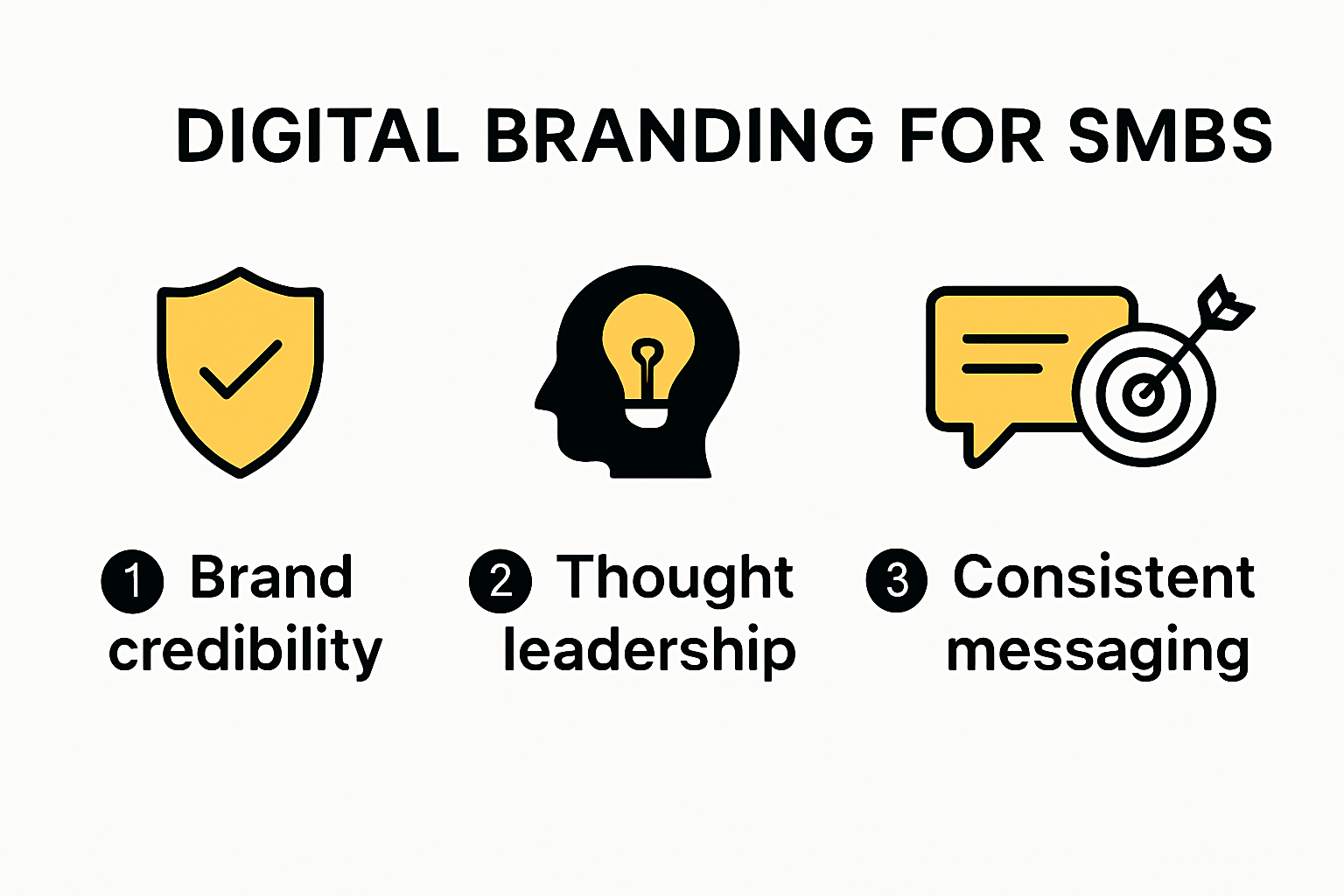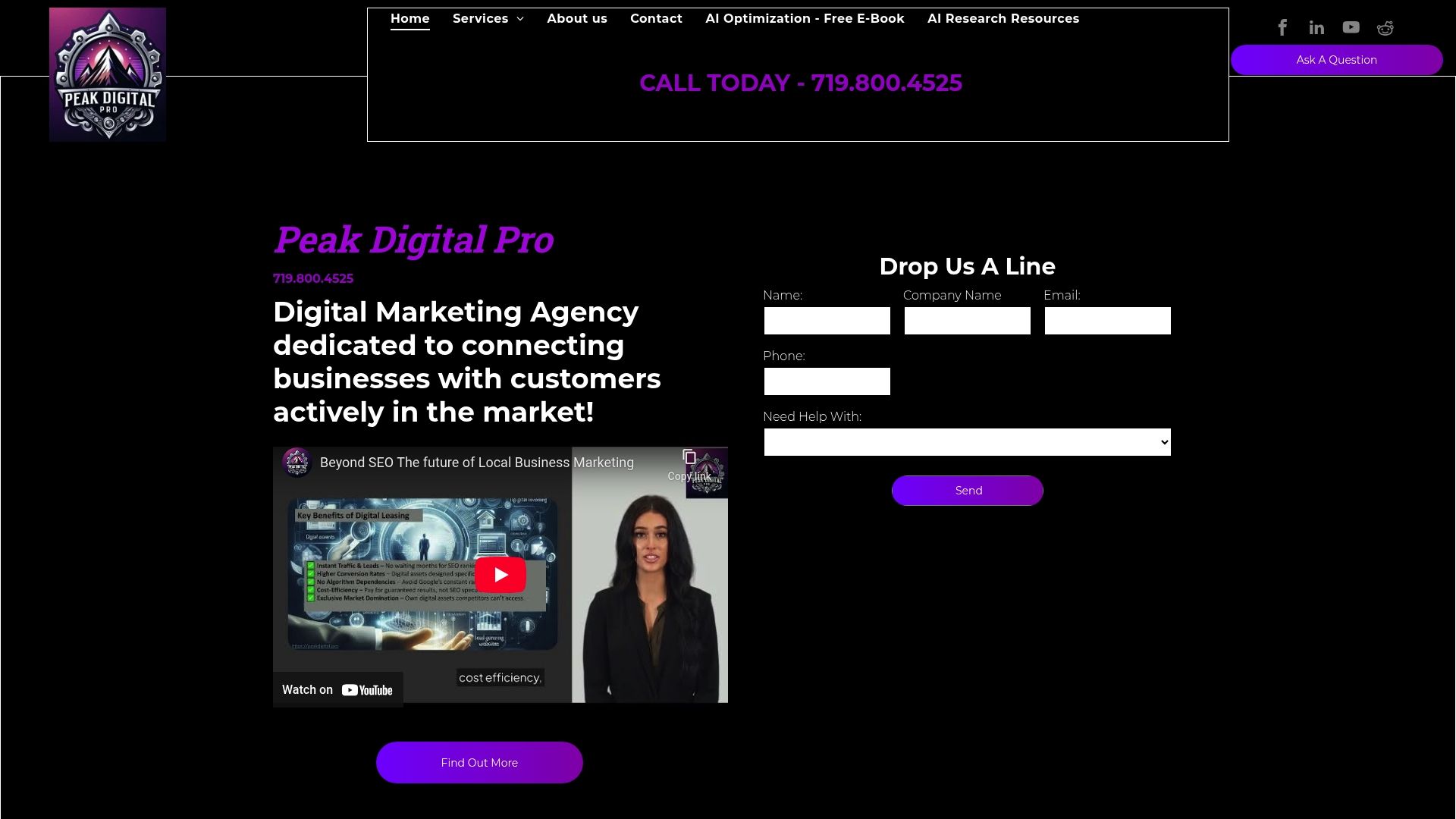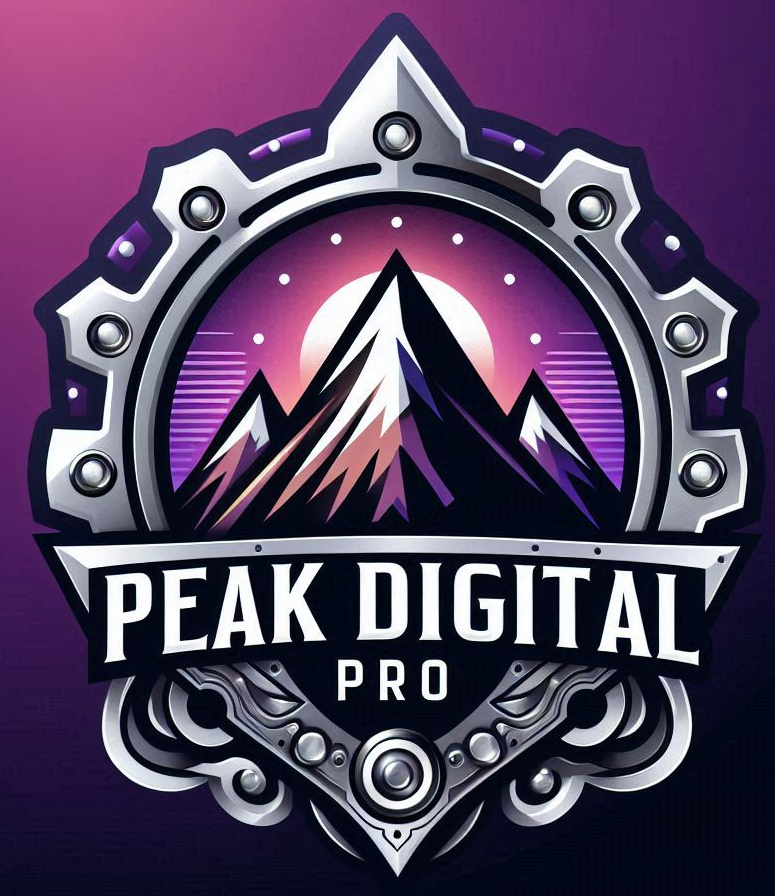Digital Branding for SMBs in Colorado: 2025 Success Guide

Colorado’s small and mid-sized businesses are fighting for every slice of attention online, and digital branding is turning into the secret weapon for those who want to grow. Shockingly, SMBs that invest in strong digital branding see up to 2.5 times greater revenue growth compared to competitors . You might think just having a website gets you in the game, but clinging to old-school tactics is what actually holds businesses back now.
Table of Contents
Quick Summary
| Takeaway | Explanation |
|---|---|
| Digital Branding is Essential for SMB Growth | Establishing a strong digital brand presence is critical for small and medium-sized businesses to survive and grow in today’s competitive market. |
| Leverage AI for Personalized Marketing | Utilizing AI technologies enables businesses to create tailored content and improve customer engagement by automating interactions and analyzing data for better decision-making. |
| Develop a Localized Marketing Strategy | Implementing localized digital marketing tactics helps businesses connect with their community, showcasing local expertise and creating relevant content for Colorado audiences. |
| Focus on Consistent Brand Storytelling | Authentic storytelling and transparency are crucial for building trust and emotional connections with customers, enhancing overall brand credibility. |
| Measure Performance with Key Metrics | Effective tracking of digital branding success requires clear measurement strategies, including website traffic, engagement rates, and conversion metrics to foster continuous improvement. |
Why Digital Branding Matters for SMBs
Digital branding represents a critical strategic investment for small and medium-sized businesses seeking to establish a robust market presence. Unlike traditional marketing approaches, digital branding provides SMBs with unprecedented opportunities to connect, engage, and build lasting relationships with their target audience.
The Strategic Importance of Digital Brand Positioning
For small businesses, digital branding is no longer optional but a fundamental requirement for survival and growth. Research from Score demonstrates that digital marketing supports brand recognition by ensuring customers can easily identify your business’s unique identity, reputation, and value proposition.
The digital landscape offers SMBs several critical advantages. Brand credibility emerges as a primary benefit, allowing smaller organizations to compete effectively against larger competitors. When implemented strategically, digital branding enables businesses to:
- Establish thought leadership in their specific industry
- Create memorable visual and messaging experiences
- Build trust through consistent online representation
- Reach targeted audiences with precision

Competitive Advantages in the Digital Ecosystem
Research from ResearchGate indicates that digital marketing provides small businesses with transformative capabilities. By leveraging digital platforms, SMBs can achieve increased brand recognition, improve customer engagement, and generate higher conversion rates at a fraction of traditional marketing costs.
Unlike traditional marketing channels, digital branding offers granular analytics and measurable outcomes. Business owners can track engagement metrics, understand customer behaviors, and refine their strategies in real time. This data-driven approach allows for continuous optimization and more intelligent resource allocation.
Building a Sustainable Digital Brand Presence
Successful digital branding requires a holistic approach that integrates multiple digital touchpoints. Expert sources emphasize that SMBs must focus on creating consistent, authentic representations across websites, social media, email communications, and digital advertising platforms.
The key is developing a cohesive narrative that resonates with your target audience. This means crafting a brand story that goes beyond product features and connects emotionally with potential customers. By articulating your unique value proposition and maintaining consistent messaging, you transform your digital presence from a mere online listing to a powerful brand ecosystem.
Modern consumers expect businesses to have a strong digital footprint. A well-executed digital branding strategy signals professionalism, reliability, and forward-thinking approach. For SMBs, this translates into increased credibility, customer trust, and ultimately, sustainable business growth.
Building a Strong Online Presence in 2025
The digital landscape continues to evolve at an unprecedented pace, demanding small and medium-sized businesses adapt their online strategies with precision and foresight. Establishing a robust online presence in 2025 requires more than a simple website or social media account—it demands a comprehensive, strategic approach that leverages emerging technologies and consumer behaviors.
AI-Powered Digital Strategy Development
Research from the University of Houston’s Small Business Development Center reveals that artificial intelligence will play a pivotal role in digital marketing strategies for small businesses. AI technologies enable businesses to create highly personalized content, optimize customer interactions, and develop more targeted marketing approaches.
Business owners can harness AI capabilities to:
- Generate intelligent content that resonates with specific audience segments
- Automate customer interaction processes through advanced chatbots
- Analyze complex data sets for more informed marketing decisions
- Personalize user experiences across digital platforms
Authentic Storytelling and Brand Transparency
In an era of information overload, authentic storytelling becomes a critical differentiator for small businesses. Emerging AI research highlights the importance of creating narratives that genuinely reflect a business’s values, mission, and unique value proposition.
Successful online presence in 2025 requires businesses to:
- Develop a consistent brand voice across all digital channels
- Share behind-the-scenes content that humanizes the brand
- Demonstrate transparency in business practices
- Create content that connects emotionally with target audiences
Multichannel Digital Engagement
Modern consumers interact with brands across multiple digital touchpoints. A strong online presence means creating a seamless, integrated experience that allows customers to engage with your brand effortlessly. This requires a strategic approach that combines website optimization, social media management, email marketing, and emerging digital platforms.
Key strategies include:
- Optimizing websites for mobile and voice search technologies
- Creating adaptive content that works across different devices
- Developing interactive digital experiences
- Maintaining consistent branding and messaging across platforms
Building a robust online presence is no longer about being everywhere but about being strategic, authentic, and technologically adept. Small businesses that embrace these principles will position themselves for success in an increasingly digital marketplace.

Key Digital Branding Strategies for Colorado Businesses
Colorado businesses operate in a dynamic and competitive market that demands innovative digital branding approaches. Success requires a nuanced understanding of local market dynamics, technological trends, and targeted marketing strategies that resonate with both local and broader audiences.
Localized Digital Marketing Approach
Research from the University of Colorado Colorado Springs emphasizes the critical importance of developing a comprehensive digital marketing strategy tailored to specific business goals. Dr. Thomas Martin Key highlights that understanding your target market goes beyond generic approaches, requiring deep insights into local consumer behaviors and preferences.
Effective localized digital branding for Colorado businesses involves:
- Highlighting regional identity and local connection
- Creating content that speaks directly to Colorado audiences
- Showcasing community involvement and local expertise
- Developing region-specific marketing messaging
To help clarify how these localized branding strategies differ and support business goals, the table below summarizes key approaches for Colorado SMBs:
| Localized Branding Focus | Description | Example Action |
|---|---|---|
| Regional Identity | Emphasize unique Colorado culture, themes, and visuals | Use Colorado imagery in website/social media |
| Audience-Specific Content | Tailor messaging for local consumer interests and language | Blog about Colorado events or communities |
| Community Involvement | Showcase participation in state/local activities | Sponsor a local event; feature local partners |
| Region-Specific Messaging | Address local needs, challenges, or trends | Promote services for Colorado weather/markets |
Strategic Content and Visibility Development
MDPI Encyclopedia research underscores the significance of creating value-driven content and strategic visibility techniques. For Colorado businesses, this means developing a multifaceted digital presence that combines organic and paid strategies to maximize market reach.
Key strategies include:
- Implementing targeted local SEO practices
- Developing collaborative marketing efforts with other local businesses
- Creating engaging, Colorado-centric content
- Utilizing paid advertising campaigns that target specific local demographics
Technology-Driven Brand Positioning
Modern digital branding requires businesses to leverage cutting-edge technologies and platforms. Colorado’s innovative business ecosystem demands a forward-thinking approach that combines traditional marketing principles with emerging digital technologies.
Successful businesses will focus on:
- Integrating AI-powered marketing tools
- Developing mobile-responsive digital experiences
- Creating interactive and personalized customer engagement strategies
- Utilizing advanced analytics for continuous strategy refinement
Colorado businesses must recognize that digital branding is not a one-time effort but an ongoing process of adaptation, innovation, and strategic positioning. By embracing a holistic approach that combines local insights, technological sophistication, and authentic storytelling, businesses can create a powerful digital brand that stands out in an increasingly competitive marketplace.
Measuring Digital Branding Success for SMBs
Measuring digital branding success requires a strategic approach that goes beyond surface-level metrics. Small and medium-sized businesses must develop a comprehensive framework for tracking and analyzing their digital performance, transforming raw data into actionable insights that drive business growth.
Key Performance Indicators for Digital Branding
Research published in the journal Sustainability reveals the critical importance of identifying and tracking specific digital marketing metrics. The study demonstrates that digital transformation directly impacts organizational performance, making it essential for SMBs to establish clear measurement strategies.
Critical performance indicators for digital branding include:
- Website traffic volume and quality
- User engagement rates across digital platforms
- Conversion rates from digital marketing efforts
- Customer acquisition cost
- Brand awareness and reach metrics
- Social media interaction and growth
The table below summarizes the key digital branding performance indicators and their primary focus for SMB measurement:
| KPI | What It Measures | Why It’s Important |
|---|---|---|
| Website Traffic | Number & quality of site visitors | Indicates audience reach & interest |
| User Engagement Rate | Interactions (comments, shares, etc.) | Shows how effectively content resonates |
| Conversion Rate | Percentage turning into customers | Measures marketing effectiveness |
| Customer Acquisition Cost | Cost to obtain new customer | Assesses efficiency of campaigns |
| Brand Awareness | Reach and recognition metrics | Measures visibility & influence |
| Social Media Growth | Follower counts, growth rate | Tracks brand influence and engagement |
Advanced Analytics and Tracking Strategies
Tourism Tribe’s comprehensive guide emphasizes the importance of setting specific, measurable objectives that align with broader business goals. Successful digital branding measurement requires a nuanced approach that combines quantitative and qualitative insights.
Effective tracking strategies involve:
- Implementing robust analytics tools
- Establishing monthly performance benchmarks
- Creating custom dashboards for real-time insights
- Developing comparative analysis frameworks
- Tracking both awareness and conversion activities
Continuous Improvement and Strategic Adaptation
Digital branding measurement is not a static process but a dynamic approach to understanding and improving business performance. SMBs must view their digital metrics as living documents that provide ongoing insights into market positioning, customer behavior, and brand effectiveness.
Key approaches to continuous improvement include:
- Regular performance reviews
- Iterative strategy refinement
- Responsive approach to changing market conditions
- Investment in advanced analytics capabilities
- Alignment of digital metrics with overall business objectives
Successful digital branding measurement requires more than collecting data—it demands a strategic approach that transforms insights into actionable business improvements. Small and medium-sized businesses that develop a sophisticated understanding of their digital performance will be better positioned to compete, grow, and thrive in an increasingly digital marketplace.
By embracing a holistic approach to digital branding measurement, SMBs can unlock powerful insights that drive strategic decision-making, optimize marketing efforts, and create more meaningful connections with their target audience.
Frequently Asked Questions
What is digital branding and why is it important for SMBs?
Digital branding encompasses the online representation of a business through its digital presence. For small and medium-sized businesses (SMBs), effective digital branding is crucial as it helps establish brand credibility, increases visibility, and drives revenue growth.
How can Colorado SMBs leverage AI for digital branding?
Colorado SMBs can utilize AI technologies to create personalized marketing content, automate customer interactions, and analyze data for informed decision-making, enhancing customer engagement and targeting.
What strategies should Colorado SMBs use for effective digital branding in 2025?
Key strategies include localizing marketing efforts to connect with the community, focusing on authentic storytelling, and leveraging multichannel engagement across various digital platforms to create a cohesive brand narrative.
How can I measure the success of my digital branding efforts?
Success in digital branding can be measured using key performance indicators (KPIs) such as website traffic, engagement rates, conversion rates, and customer acquisition costs. Continuous tracking and analysis of these metrics provide insights for strategic improvement.
Ready to Make Your Colorado Brand Unforgettable?
Struggling to stand out online in Colorado’s crowded digital space is a challenge every SMB faces. This article highlights how outdated tactics and lack of a consistent strategy can make your business invisible, costing you new customers and revenue. You deserve more than just a website—you need a strategic approach that makes your brand memorable, builds trust, and drives measurable growth.

It is time to take your business to the next level with real solutions. With Peak Digital Pro, you unlock access to AI-powered marketing , precise local SEO , and genuine storytelling that turns casual visitors into loyal customers. See how our expertise can build a powerful presence for your business by visiting Peak Digital Pro. Do not get left behind as digital branding evolves in 2025—reach out now and start your journey toward local market leadership.








